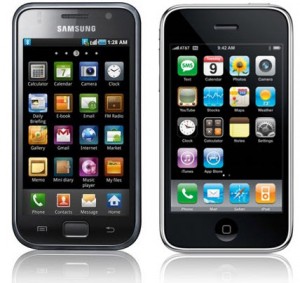As of this week, Apple is walking away with a ruling that dictates Samsung copied many aspects of the iPhone. Samsung is set to pay out over $1 billion in what boils down to way over-inflated patent infringement. Now Samsung will of course appeal and attempt to have this decision mitigated as much as possible in order to save a few quid and its own backsides. However over inflated, out of proportion this whole fiasco was, one can be certain that somewhere in the corner of the court room, Microsoft and Nokia look at each other, nod their heads and smile.
What the general public now will “learn” from the past events will be various interpretations of “Android Copied iPhone”. It isn’t just Samsung though, so shouldn’t that also apply to HTC phones as well? The answer is simply yes, however, as the lawsuits Apple and Samsung filed against each other involved hardware as well, this battle was between the Korean Giants and Cupertino Fruits. There are two likely reasons why it was Samsung who were in court, not another Android OEM. The first one is that at any given time, only one Android maker is making profits. That was HTC at one point, but is currently Samsung. That makes it a prime target for Apple, as when Steve Jobs said he was prepared to go nuclear on destroying Android, it’s wise to choose the company with the biggest public perception. Secondly, whereas HTC has its own designs, as do LG and Sony, Samsung was dumb enough to copy the hardware aesthetics of the iPhone:

The mobile industry is heading in a single direction and has been since the first iPhone came out. The large touch screen interface, generally easy to use OSes and UIs, push email and installable apps were bound to emerge on any platform as technology advances. The importance is who gets their stamp on an improved existing idea first; and that person (company) will then become the school child in a playground who thinks he’s reinvented how to build a sand castle and will challenge anyone who says otherwise.
So where does Windows Phone stand then? For the past 18 months, every Windows Phone review has noted the radically different UI and the way things work. However, beneath the surface, all is still the same – easy to navigate UI, touch screen interface, apps. I’m not for a second saying that any of the items on WP are copied from any other company. I’m merely highlighting that the same functions can be integrated well into a phone OS without infringing anything, and Apple noted as such during the courtcase. The simple rule of thumb is just to be original, something many companies, technology or not, seem to be severely lacking these days.
Does Windows Phone have an advantage now? I would say a profound yes. While Apple and Samsung now tread very carefully, which means development will slow, Microsoft has a clean slate to push out as many new and exciting features and devices as it can. Plus for customers like me who do see the similarities in Android and iOS, it may be refreshing to actually change to a new phone OS in Q4 2012. The ruling against Samsung may even make the Korean technology company to spend more time on its Windows Phone 8 offerings; although it has released some Windows Phones already, Android has always been its main focus. However, knowing that Apple isn’t on a witchunt for Windows Phone may be a key incentive for it – but it will have to think up some new hardware designs.
The first round of the battle in the ever-growing smartphone wars has been fought. Apple emerged victorious, Samsung lost in court, but the true winner to me looks to be Microsoft.
